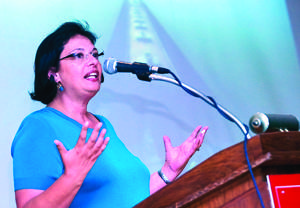Journalist discusses border crossing

Journalist discusses border crossing
September 23, 2008
“How does a woman just walk away from her children and go 2,000 miles away to Los Angeles?”
This was the question that won Sonia Nazario, former projects reporter for the Los Angeles Times, a Pulitzer Prize for a series on children illegally immigrating to the United States to search for their parents.
Nazario said her story started with a maid in Los Angeles who’d left her four children behind in Guatemala because she couldn’t afford to feed them.
When Nazario inquired one morning as to whether her maid was ever going to have any more children she was shocked to discover that her maid was working to support the children she hadn’t seen in more than a decade.
“She told me that morning that she would coax them to roll over in bed, saying ‘sleep face down so your stomach doesn’t growl so much’,” Nazario said.
After promising her children to return within a few years, the maid hadn’t yet been able to go back, and it had been 12 years.
Inspired to write about it, Nazario went on the journey children take to track down their parents. Nazario rode trains, endured extreme heat and cold, and talked to the people she found along the way.
She found children traveled with a 12-year-old boy, learned of a 7-year-old who’d traveled the trains alone to find his mother. She found children who’d never made it out of Mexico or Central America; she found children who’d lost limbs in train accidents, and children who had tried multiple times to make it to the United States and wouldn’t let the difficulty of the journey keep them from persisting.
“I was stunned by the gritty determination of these kids. You know, when people talk about building a wall, I think that Americans just don’t understand this type of determination,” she said.
Nazario’s story focuses on one boy, Enrique, who made eight attempts and traveled more than 122 days to find his mother, who’d left him when he was 5 years old.
She said Enrique told her he was searching for the answer to one question: “Does my mother love me?” He went on to say “She said she was coming back, but she hasn’t. Does she love me?”
One of the reasons Nazario wrote the story, she said, was to educate people about the realities of immigration.
Nazario said she was appalled by what she perceived as the abandonment of the maid’s children.
“I was judgmental. ‘How does a mom leave her kids?’ — and she could hear it in my voice — ‘What kind of mother could leave her kids?’” Nazario said. “Sometimes it’s easier to demonize people than to try and understand them.”
Nazario said she didn’t think most people understood that while there were problems with having a large undocumented population, there were also benefits that came out of it.
Immigrants are often willing to do jobs for a lower wage, jobs many Americans would never consider doing.
“Enrique’s mom, Lourges, would clean houses where there had been suicides. You can’t get an American to do that job for minimum wage,” she said.
Nazario concluded her speech by addressing the politics involved in immigration, saying the candidates for presidency have spoken about three ways to take care of the problem: guest worker programs, pathways to citizenship and amnesty, and enforcing current policies.
“I can tell you that all of these things have only led to increasing the level of immigration,” Nazario said.
She said failed policies would continue to fail, but had a few suggestions she’d gleaned from talking to illegal immigrants while on her journey:
“[Illegal immigrants] say that we have to tackle this exodus at its source, in terms of helping to create jobs in the four or five countries that send 80 percent of immigrants to the United States,” she said.
















